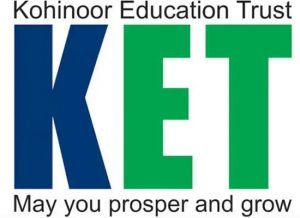Code of Conduct
The Kohinoor Group over a period of 61 years have seven core values which have taken strong roots in all the operations and thereby define Kohinoor’s culture. These are
1) Ethical Business Practices
2) Customer Focus
3) Employee Empowerment
4) Instant and Accurate Decision Making
5) Continuous Learning
6) Creativity and Innovation
7) Result Orientation
Kohinoor Education Trust as a part of Kohinoor Group has imbibed the core values of the parent organization and ensures that these are followed by all its institutions.
Kohinoor Business School (KBS): KBS was established in the year 2010-11. KBS has over a period of 12 years upheld and will continue to uphold levels of ethics and integrity in all its institutional activities. The institute has developed its own code of conduct in providing services to its stake holders.
The institute believes in the following:
a. Integrity
b. Respect for others
c. Honesty
d. Transparency
e. Accountability
f. Fairness
g. Quality education
h. Compliance with rules and regulations of University of Mumbai, Director of Technical Education, Government of Maharashtra, All India Council for Technical Education and other regulatory authorities
i. Confidentiality and privacy: institute maintains confidentiality and privacy in all the matters related to institutional governance
j. Governing body -The functioning of the governing body is in line with the Kohinoor Education Trust aims and objectiveswhich are as per the Public Charitable Trust under the Society’s Registration Act 1935 and Bombay Public Trust Act 1950.
k. Teachers’ Code of Professional Ethics: Code of Professional Ethics is specified by UGC draft regulation number F.3-1/2009 dated 30th June2010.
Faculty – Code of Professional Ethics:
Faculty is the backbone of an Education Institute. The primary function is to teach, guide students, carry out research, consultancy, and training and support institutional development activities. Each faculty is specialized in teaching specific subjects.
Major Responsibilities:
a. Teaching the subject assigned by Chairperson / HOD.
b. Determining teaching methodology, schedule and evaluation pattern on the basis of syllabus and guidelines.
c. Timely completion of all the sessions.
d. Keeping attendance record and discipline of students in the class.
e. To ensure that Academic and Examination guidelines are followed.
f. Assisting theexaminationdepartmentintimelydeclarationofresultbysettingquestion paper and evaluating the answer papers within the schedule.
g. Self-Assessment and action plan for self-development.
h. Research publication and consultancy.
i. Supporting and taking part in institutional development activities.
j. Providing the inputs to Chairperson/ Director for designing the curriculum and curriculum enrichment.
k. Mentoring students
l. Establishing network
m. Providing support to Corporate Relations for summer and final placements and for guest lectures
n. Attending/Participating/Presenting papersat National and International Conferences.
o. Attending and participating in the major institutional activities.
p. Any other responsibility assigned by the institutional head from time to time
Faculty General rules:
a. Faculty members shall not involve himself/herself in any act of moral turpitude on his/her part which may cause impairment or bring discredit to the institution
b. Faculty members shall not involve in any form of political activity
c. Faculty members shall not participate in any strike or demonstration
d. Faculty members shall not issues circulars or guidelines without the permission of the institutional head
e. HOD’s are responsible for the performance of the faculty member
f. Faculty members shall treat students with respect
Non-teaching staff – Code of Professional Ethics:
Major responsibilities
• Should follow the institutional guidelines
• Carryout the duties and responsibilities as instructed by the authorities
• Adhere to the timings
• Adhere to the institutional discipline
Non-teaching staff General rules:
a. Non- teaching staff should follow code of professional ethics and conduct at all times.
b. Non- teaching staff should have high standard of integrity
c. Non- teaching staff should be committed
d. Non- teaching staff should not involve in any form of political activity
e. Non- teaching staff should not to participate in any strike or demonstration
f. Non- teaching staff should not issue circulars or guidelines without the permission of the institutional head
Student’s -Code of Professional Ethics:
• Campus Code of Conduct
• Dress Code
• Security
Institute lays a great emphasis on discipline, good conduct, good behaviour and co-operation without which no student can achieve excellence in any field. Disciplinary action will be taken against students found indulging in any of the above activities. Anyone found indulging in ragging in any form within or outside the campus shall be instantly expelled (ref: The Maharashtra Prohibitions of Ragging Act, 1999). Anti-ragging committee of the institute will take necessary Action against students indulging in ragging. However, the management reserves the rights to reinstate such students.
• Campus Code of Conduct
a. A student should behave in a manner appropriate to the academic environment while in college or anywhere outside.
b. He/she should understand that they are the institute representative and project the image of the Institute, through their behaviour.
c. Students are expected to maintain the dignity and decorum of the classroom through appropriate dress code and behaviour.
d. Any act of disrespect or discourtesy to the guests, faculty members or the staff will be considered as an act of indiscipline.
e. Ragging, Consumption of Alcohol, Drugs, Smoking, Chewing of Tobacco, Gutka and Paan is not permitted.
f. Chewinggum in the campus is strictly prohibited.
g. Wearing of I-Card is compulsory when on campus.
h. Use of Cell phones into the class room, computer labs & library is strictly prohibited.
i. Indiscipline and use of unfair means: Students are supposed to behave in a manner which is in accordance with the institutional guidelines. The institute will take necessary action for an act of indiscipline, use of unfair means in assignments, exams, project work, etc. or damage to the Institute’s infrastructure facilities.
j. All committee meetings, functions, programs and seminars must be organized with the prior approval of the Faculty-in-charge/ Director.
k. The Management of the institute reserves the right of expelling any student on the ground of non-compliance of the guidelines and regulations laid down from time to time. The decision of the Management will be finaland binding. 5.2. Dress Code
• Dress Code
a. The students are required to dress in neat attire.
b. Formals/Uniforms are mandatory for Guest lectures, Presentations and Workshops for which announcements will be made in advance.
• Security
a. Kohinoor Business School has deployed round the clock security guards, to keep a check around the campus. CCTV Cameras are installed across the campus.
b. The campus is fenced by proper boundary walls.
c. The students are expected to abide with the campus security rules and cooperate with the security guards.
Various Committees to monitor the code of conduct on campus
1. Internal Complaints Committee
2. Anti-Ragging Committee
3. Grievance Redressal Committeed

